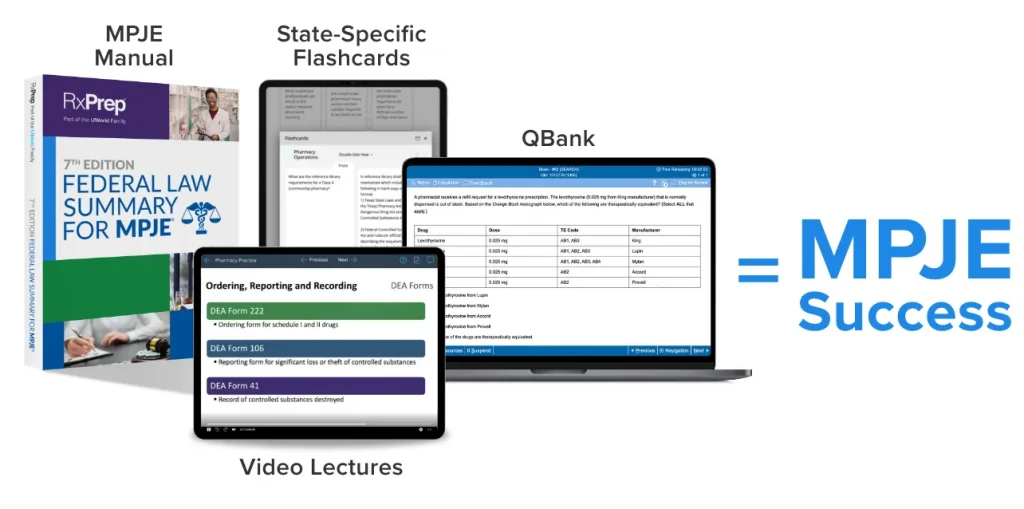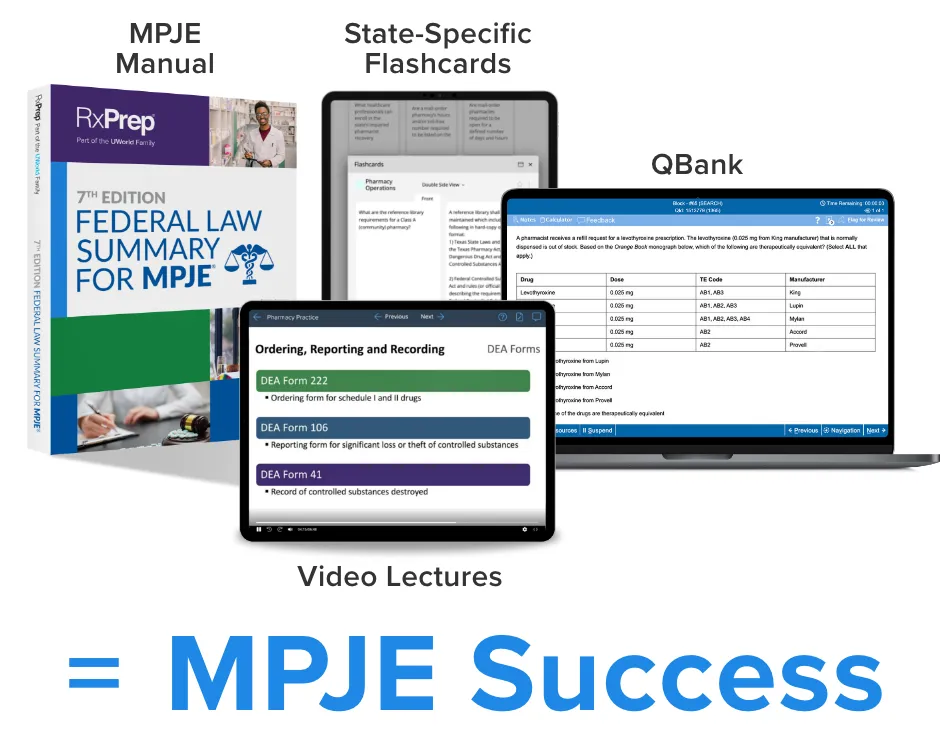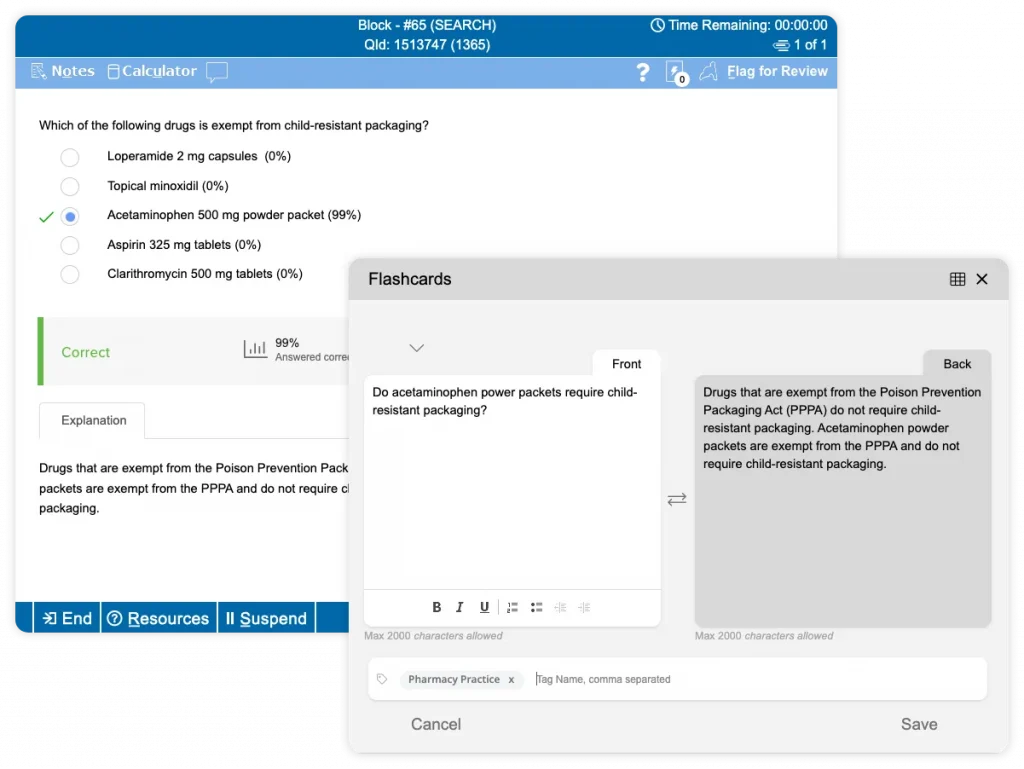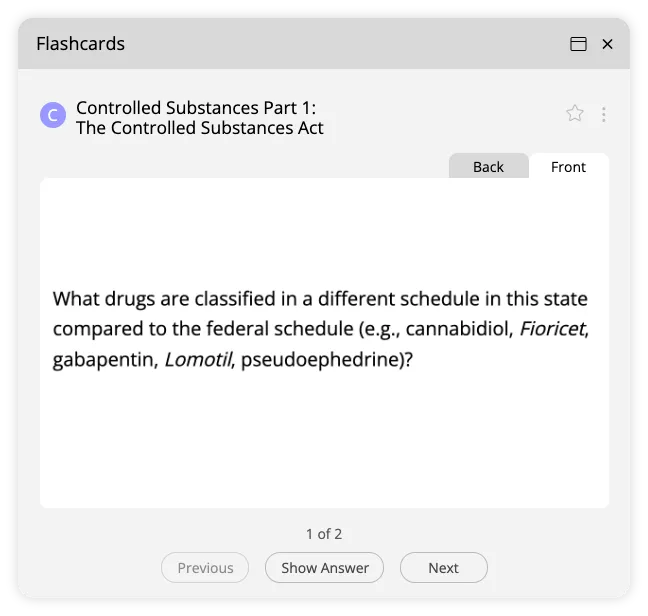
To work in most states, pharmacists must pass the Multistate Pharmacy Jurisprudence Examination®, also called the MPJE® (exceptions include Arkansas, Idaho, and California) in addition to the North American Pharmacy Licensure Examination® (NAPLEX®). The MPJE is a pharmacy law examination created by the National Association of Boards of Pharmacy® (NABP®) in the United States to help state boards of pharmacy assess applicants’ competency and knowledge of pharmacy laws and regulations. Passing the MPJE requires a thorough understanding of how pharmacy law affects practice, including state and federal laws and regulations.
The MPJE can be challenging as it utilizes legal terms, and different jurisdictions may have different terminology.
Did you know that many states use different terms for the “pharmacist-in-charge”? Some examples include supervising pharmacist, managing pharmacist, pharmacist manager, qualifying manager, and prescription department manager.
This MPJE study guide will teach you how to create an effective and efficient study plan for the MPJE exam, thereby increasing your chances of passing.
To maximize efficiency, concentrate on the topics that will be on the MPJE by reviewing the MPJE Blueprint (i.e., exam outline). The four topic areas represented on the exam include:
| Principal Topic Areas of the MPJE Competency Statements | ||
|---|---|---|
| Area | Topic | % of Test |
| Area 1 | Licensure/Personnel | ~ 22% |
| Area 2 | Pharmacist Practice | ~ 33% |
| Area 3 | Dispensing Requirements | ~ 24% |
| Area 4 | Pharmacy Operations | ~ 21% |
Including both state and federal law in your MPJE study plan is essential as, in many instances, jurisdictions follow federal law.
For example, some states require a biennial (i.e., every two years) controlled substance inventory, which is consistent with federal requirements, whereas other states may require more frequent inventories. The strictest law is followed if the state laws conflict with federal laws.
The UWorld RxPrep MPJE study materials cover all of the content outlined in the MPJE competencies and can be used to execute your MPJE study plan. These materials include the latest UWorld RxPrep Federal Law Summary for MPJE with a fill-in-the-blank study guide (i.e., course manual), question bank (QBank), video lectures, and state-specific flashcards.


The course manual covers all of the important MPJE topics, such as controlled substances, pharmacy operations, and compounding, with illustrated charts, diagrams, tables, and thorough explanations with example scenarios to help you better understand the concepts. The course manual complements the QBank, video lectures, and state-specific flashcards for a more comprehensive study experience.
Pharmacy operations includes, but is not limited to, the following topics:
An overview of laws and regulations affecting the practice of pharmacy, including but not limited to:
A summary of the testable controlled substance laws and regulations. Most states automatically abide by or have controlled substance laws that are consistent with federal laws, but some states may differ. Some common controlled substance topics to be familiar with include:
A focused review and history of relevant federal laws affecting the practice of pharmacy and their importance.
Pharmacy OperationsPharmacy operations includes, but is not limited to, the following topics:
An overview of laws and regulations affecting the practice of pharmacy, including but not limited to:
A summary of the testable controlled substance laws and regulations. Most states automatically abide by or have controlled substance laws that are consistent with federal laws, but some states may differ. Some common controlled substance topics to be familiar with include:
A summary of laws governing OTC medications, such as pseudoephedrine and dextromethorphan, codeine cough syrup, and hypodermic syringes and needles.
While reviewing the MPJE manual, simultaneously utilize the 9-page fill-in-the-blank study guide located at the end of the manual to investigate potential federal and state law differences. Our online state-specific pre-filled flashcards are a companion to the 9-page study guide in the MPJE manual. After reviewing your state’s laws on your board’s website, you can test your knowledge by using the UWorld RxPrep state-specific flashcards. The flashcards make it easy to review and memorize your state’s most up-to-date laws.
After you have reviewed the comprehensive MPJE manual, the next step is to immerse yourself in the testing environment. Practice questions in the QBank are a great way to test your knowledge and get comfortable with MPJE-style questions on federal content. Take the timed practice exam about 2 weeks before your test date. The QBank questions directly link to the related video content required to answer the question.
Our engaging video lectures, filmed by experienced pharmacists, help simplify complex concepts. The UWorld RxPrep videos are presented in small, manageable segments for quick content review. The video library includes 76 short videos.
What do top performers have in common? Top performers use UWorld RxPrep to ace the MPJE
Jurisprudence exams are challenging for multiple reasons. A vast majority of pharmacists did not go to law school, and as such, have a hard time interpreting legalese (the technical language of legal documents that is often difficult to understand).
| Legalese |
|---|
| Shall: you have to do it |
| May: permissible, but not required |
| May not: not allowed |
Additionally, you may not have learned the laws and regulations in pharmacy school for the jurisdiction for which you wish to practice. If possible, we encourage you to seek employment as an intern or graduate intern in the jurisdiction you wish to practice in to gain real-life experience applying pharmacy laws to daily pharmacy practice.
Before your exam, you will need to put in time and effort towards your studying to be successful.
Your class schedule, work schedule, and personal obligations will help you determine your study schedule and how long you will need to prepare for the exam. Everyone's situation is unique. Some test takers may be able to learn all the exam material in 1 month or even faster with a lot of practical experience in the desired jurisdiction; some may require 3 months or longer. The worst thing you can do is try to cram all the exam content a week or two before your exam. You run the risk of overwhelming yourself and not fully comprehending all of the exam topics on test day. There is not a one-size-fits-all answer for how long to study, but we recommend you give yourself an ample amount of time to study and incorporate study breaks.
Rather than relying solely on your pharmacy school courses, we recommend you study with UWorld resources, which include the MPJE QBank, manual, video lectures, and state-specific flashcards, to give yourself the best chance of passing the MPJE. It is just as important to create a solid MPJE study plan for your exam as it is to use the right materials.
When you get to a topic on your MPJE study plan, use your time efficiently by first assessing how well you know the topic. If you feel confident about your knowledge, perhaps a quick refresher of testable content in the manual is all that is needed before proceeding to the QBank for that topic. If you do not feel confident with the topic, spend more time reading the chapter and watching the corresponding video lecture before attempting the QBank.
To complete the QBank questions for a topic, create a test with questions from that chapter. Questions can be completed in tutor mode, which immediately grades each question and provides an explanation upon submission of the answer. QBanks can also be taken in “timed” mode, which mimics the timing of questions that you will see on the MPJE.
At any point in your studies, you can create integrated tests in the QBank by mixing questions from multiple chapters. Additional tools that will aid in your studies as you navigate the material, as well as how to assess your performance, are described below.
Besides reviewing the pre-made state-specific flashcards, you can create your own flashcards as you progress through the UWorld RxPrep MPJE QBank by transferring written and visual content from practice questions and explanations to both sides of a new flashcard. You can also add your own notes and create custom tags for improved flashcard searchability.

Within the flashcards, our "Study" feature includes spaced repetition. Spaced repetition is a proven study technique that improves memory recall and allows you to set the frequency with which you encounter questions to help boost memory retention. Flashcards that you find difficult will appear more frequently, while those that you find easy will appear less frequently.

Preparing for the MPJE differs from preparing for the NAPLEX, which involves a thorough review of pharmacotherapy. When studying for the MPJE, you have to rely heavily on the test prep you choose and the state board website where you are seeking licensure. State board of pharmacy websites contain state laws, regulations, policies, and often a frequently asked question (FAQ) section. The FAQ section contains the questions that are frequently posed to the board of pharmacy and often clarifies the requirements that are not easily found in state law.
Do not wait to start using a high-quality exam preparation course, like the UWorld RxPrep MPJE online course. Navigating state laws and regulations is daunting, and the UWorld RxPrep online course 9-page study guide will help you navigate and identify where individual state laws differ from federal law.
Decide if you know a topic well by reviewing your performance
When completing the MPJE question bank: